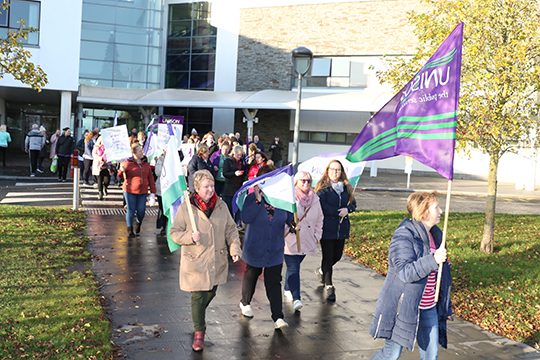Striking junior doctors still angry at what DoH is offering
The Department of Health (DoH) has advised patients that the health service will experience widespread disruption next week due to industrial action by junior doctors this week.
A two-day strike has been called by the BMA Junior Doctors Committee from 7am on Wednesday 22 May to 7am on Friday 24 May.
HSC Trusts in a recent statement said that it will work to mitigate the impact as much as possible and will publish more information next week on affected service areas.
Significant disruption is expected in local hospitals not only on the two strike days but over following days.
The Department says that it stands ready to continue discussions with the Junior Doctors Committee and does not accept that talks have “collapsed”.
A DoH spokesperson added that there are “important issues of substance to be progressed, including reform of the current junior doctor contract in NI.

“The Department has offered a process of independent arbitration, but this has not been taken up to date.
“When the ballot for industrial action was launched, junior doctors – like the rest of the NI health service staff – had received no pay award for 2023/24.
“That is no longer the case. The 2023/24 recommendations of the national pay review body, the DDRB, have now been implemented in NI. The award will be paid in the June pay run, landing in pay packets next month.
“For junior doctors in Northern Ireland, the award will bring an average pay increase of 9.07%, with those in their first year receiving a 10.68% uplift.
“The Department cannot resolve the BMA demand for pay restoration – for a pay settlement that reverses public sector pay limits over the past decade and more.
“That is an issue that has impacted public sector employees across the UK as a result of UK Government policy. It is a national issue that cannot be resolved locally.”
***
Junior Doctors In NI are sick to the back teeth of the pay offer and need parity of esteem with their English colleagues
The BMA JuniorDoctors Committee in Northern Ireland is fighting its corner as the Department of Health.
The Junior Doctors Committee in England have in contrast have agreed a mediator and the issues are moving towards agreement.
“Junior doctors in Northern Ireland are undervalued, underpaid, overworked, and lacking in training opportunities. That’s why we’re fighting for fair pay. That’s why we’re fighting for full pay restoration,” says a statement on their campaign website.
Junior doctors in Northern Ireland will stage further strike action after pay talks with the Department of Health broke down.
Two 48-hour full walkouts will take place from 7am on Wednesday 22 May to 7am on Friday 24 May, and from 7am on Thursday 6 June to 7am on Saturday 8 June.
Speaking about the decision, Northern Ireland junior doctor committee (NIJDC) chair, Dr Fiona Griffin, said on the NI Junior Doctor website that: “After our 24-hour walk out on 6 March we were invited by the Health Minister to enter talks with his officials about our pay asks.
“We agreed to this in good faith and were hopeful for productive and meaningful negotiations.
“Despite some progress on non-pay issues, regrettably there has been no progress at all on our key asks around pay, including a commitment to work towards full pay restoration.
“This has left us with no choice but to escalate our strike action.”
The junior doctors maintain that “in Northern Ireland, all eligible junior doctor BMA members who have notified us that they hold a contract with an HSC employer in Northern Ireland (whether solely or in addition to a non-HSC contract), excluding any armed forces trainees, can take part in industrial action.”
So, the dye is cast. Junior doctors in Northern Ireland are to strike for what they say are better wages and conditions.
This will be a period when people across Northern Ireland will need to be careful on the roads and generally avoid accidents, and they can attend their local GPs or pharmacy for further advice if necessary and avoid Emergency Departments.
Somewhere in the murky world of devolved government finances the outworking of the Barnett Formula has not done Northern Ireland any favours.
In a post-Covid NI Assembly that still has to fire up and function effectively and clear a backlog of work and bills, and with underlying political instability, it may be that the junior doctors in Northern Ireland are stuck between a rock and a hard place and that the financial commitment to wages’ parity of esteem cannot be met.
If this were the case then the MLAs, Ministers and Executive up at Stormont have their work cut out if they are keep our regional NHS from a state of crisis and impending collapse.

























